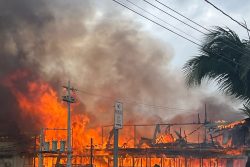WASHINGTON (Reuters) – An earthquake killing up to 200,000 people would have been bad enough anywhere, but in Haiti, where AIDS, tuberculosis and malaria are rampant, children are malnourished and hygiene is already a challenge, it may create one of the worst medical disasters ever.
Medical teams pouring in to set up mobile hospitals say they are already overwhelmed by the casualties and fear the worst is yet to come as infection and disease take hold.
Haitian officials said the death toll from Tuesday’s magnitude 7 quake was likely to be between 100,000 and 200,000, and no one has even begun to get a count of injuries, said Jon Andrus of the Pan American Health Organization, the Americas arm of the World Health Organization.
“Many people have suffered multiple fractures and internal injuries,” Andrus said yesterday. “By any stretch of the imagination it is going to be incredibly difficult. The population in Haiti was already vulnerable and faced enormous health threats.”
Without quick treatment, wounds will become infected. “The most urgent public health threats resulting from this disaster are from wounds and injuries,” Andrus said. Tetanus and gangrene are immediate threats, as is the spread of measles, germs causing meningitis and other infections with crowding.
Corpses were being burned or dumped in mass graves but Andrus said this was unnecessary and could damage the mental state of survivors, Andrus told a news conference.
Water is at a premium and diarrhoea is likely. Children, the weak and elderly will die unnecessarily from diarrhoeal disease that would be easily treated with water and rehydration salts under more normal conditions, doctors said.
Haitian women will continue to deliver babies and previously healthy people will become ill because of the shortage of food and water.
“Because of the amount of time that has gone by, they’ll probably have a lot of diabetes that is out of control,” Dr Steven Harris, senior medical director for the US Centers for Disease Control and Prevention in Haiti, said in a telephone interview. “There will be kidney failure because of dehydration.”
The CDC is anticipating outbreaks of infectious diseases such as measles and malaria. “They are the typical kinds of diseases we have here anyway but they certainly would be worse following a disaster like this,” Harris said.
“Things are going to get much, much worse before they are going to get better,” said Josh Ruxin, a Columbia University public health expert living and working in Rwanda.
But Andrus, Ruxin and other experts see one small spark of hope. “While this is a terrible tragedy, there is an opportunity to do something which decades of aid hasn’t and that is build up a public health infrastructure that is stable,” Ruxin said.







